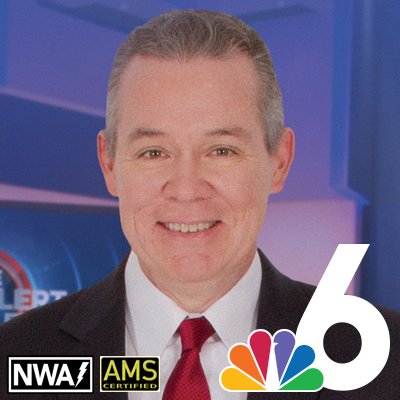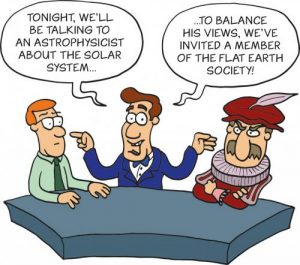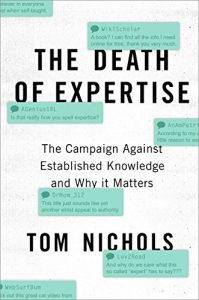23 March 2018
Miami Meteorologist John Morales Says No To False Balance
Posted by Dan Satterfield
 You’ve seen it many times on TV and in print: A story/discussion about climate change includes an interview with a knowledgeable researcher in the field, followed/paired with the opinion of someone who has no expertise at all. Some journalists call this giving both sides, but in reality, it’s not journalism. The real name is False Balance, and many of those with scientific expertise are refusing to be a part of it.
You’ve seen it many times on TV and in print: A story/discussion about climate change includes an interview with a knowledgeable researcher in the field, followed/paired with the opinion of someone who has no expertise at all. Some journalists call this giving both sides, but in reality, it’s not journalism. The real name is False Balance, and many of those with scientific expertise are refusing to be a part of it.
Universities make the same mistake, and this time it involves my friend John Morales at NBC Miami. John is one of the most highly respected meteorologists doing TV in the country (and worldwide actually), and he gave me permission to reprint what is below. He lays it out pretty clearly.
First the request:
Dear John,
Please see attached invite and draft agenda for an exciting and timely event, the 2018 Journalists and Editors Workshop scheduled for March 27- 28, 2018. We would love to have you moderate what is sure to be a dynamic conversation and I would be happy to discuss further by phone or email if you have any questions.
Please let us know if you are available to moderate and thank you for your consideration!
Sincerely,
Frank O. Mora
Steven J. Green School of International and Public Affairs
Florida International University
Miami, FL
Here’s the response from John Morales
Mr. Mora,
I’m going to respond the only way I know how to: speaking frankly.
I have serious misgivings about this. The Heartland Institute is actively working to keep Americans confused on the state of the science of climate change. Just last year they sent a mass mailing to K-12 teachers across the U.S. looking to instill doubt in the teaching of the science. Their position goes against the overwhelming scientific consensus that the globe is unequivocally warming and that it is extremely likely that humans are causing it. And while it’s important for scientists to be skeptics, Mr. Taylor is *not* a scientist. He is an attorney, with *one* course (the only one Dartmouth offers) in meteorology. Natalia Lever, on the other hand, is a biologist with additional training in sustainability.
Having FIU give equal footing in a “debate” to a Heartland Institute Juris Doctor is, in my opinion, a *disservice* to the journalists and editors in the audience. It only perpetuates what has been a huge problem with the press: False Balance. Also known as False Equivalency, it occurs when reporters, in their zeal to file a “balanced” news story, provide equal footing to fringe views that are overwhelmingly negated by the weight of the evidence.
So, I respectfully decline your invitation to serve as moderator. And I hope you’ll reconsider the entire premise of having this non-scientist with a clear political agenda “debate” the science of climate change as it relates to extreme weather events. Perhaps you can find a slot for him to present, as opposed to debate, which would still give him an opportunity to speak.
I would be happy to participate in your workshop in other ways. Since it’s designed for journalists, I would be happy to provide a short training on the scientific method, and how to properly cover science in media. I also have several talks prepared on climate, including my visit to the Arctic in 2016.
I’m sure this wasn’t the response you were expecting, and for that I’m sorry. But I feel strongly that we must find ways to improve scientific literacy in the Americas, and especially in the United States. The Keynote Conversation you propose would not serve that purpose well at all.
With respect,
John Morales, CBM, CCM
AMS Fellow Chief Meteorologist
WTVJ NBC 6, Miami
This made news in Miami as well with this piece in the Miami Herald and this as well.
John tells me that Frank Mora and the university respected his decision and he has agreed to give a talk to the audience about science and the scientific method. Perfect!
I know several meteorologists and researchers (me included) who’ve turned down appearance requests similar to this because the event was a false balance. A good friend (Detroit Meteorologist Paul Gross) was told that his invited talk to a high school class on science was to be followed by a rebuttal from the parent of one of the students! Paul explained that what he’d be telling the students was well understood peer-reviewed science. Take your pick he said, but not both.

Courtesy my friend John Cook’s Skeptical Science website. I’ll be posting about some new research he has published soon.
Fortunately for the students, the school chose to go with the science.
Journalism is about more than just fact. Journalists have a responsibility to determine the quality of opposing views and make note of it. Court reporters do “He said, She said.” That’s NOT journalism. It’s a false balance.
I am reminded of a famous quote by the great science fiction writer Isaac Asimov:
There is a cult of ignorance in the United States, and there has always been. The strain of anti-intellectualism has been a constant thread winding its way through our political and cultural life, nurtured by the false notion that democracy means that my ignorance is just as good as your knowledge.
 This is not just a question of a college seeking to explore a subject for its students. It is a symptom a greater problem, and this is just one tree in a forest of growing objection to objective scientific fact. This has spread to the level where worthless homeopathic remedies are placed beside real medicine on pharmacy shelves, leaving someone with flu symptoms to figure out what’s real versus a box of expensive sugar pills.
This is not just a question of a college seeking to explore a subject for its students. It is a symptom a greater problem, and this is just one tree in a forest of growing objection to objective scientific fact. This has spread to the level where worthless homeopathic remedies are placed beside real medicine on pharmacy shelves, leaving someone with flu symptoms to figure out what’s real versus a box of expensive sugar pills.
I highly recommend Tom Nichol’s book The Death of Expertise. He’ll tell you about the forest. As Nichol’s points out in his book, too many people think a morning with a search engine makes them an expert. It doesn’t because it’s not what you know that matters, it’s what you don’t know that you don’t know that can be vital. If you read one non-fiction book this year, read Nichol’s book.
Kudos to John Morales. My respect for him was already so high, it could not go higher, but he managed to do it. He stood up for our profession and for the enlightenment itself, and by doing so, he gave attention to an important issue.
Note: The Heartland Institute regularly sends material to both teachers and the broadcast meteorology community, and some of the claims are actually worth a laugh before we toss it in the bin.


 Dan Satterfield has worked as an on air meteorologist for 32 years in Oklahoma, Florida and Alabama. Forecasting weather is Dan's job, but all of Earth Science is his passion. This journal is where Dan writes about things he has too little time for on air. Dan blogs about peer-reviewed Earth science for Junior High level audiences and up.
Dan Satterfield has worked as an on air meteorologist for 32 years in Oklahoma, Florida and Alabama. Forecasting weather is Dan's job, but all of Earth Science is his passion. This journal is where Dan writes about things he has too little time for on air. Dan blogs about peer-reviewed Earth science for Junior High level audiences and up.
This topic of ‘false balance’ needs to be talked about by the general public, journalists, AND editors. As Andy Revkin and others have pointed out numberous times the “media’ creates headlines to gain attention for eyeballs. One primary tool they use is ‘controversy’:
Expert 1 vs. expert 1. Three cheers for John’s pointing out the “false balance’ trick that groups like Heritage hide behind to create doubt. This is a trick that some have used for years in the past with tobacco, vaccines, and seat belts. There is a long trail of evidence along by these groups.
Dan. It’s been a long time since we’ve spoken. I’m wondering if you could forward my question to Morales and Mora. Would John Morales have been willing to debate me? Recall that I am an AMS Fellow, a Lead Author of the IPCC, member of AGU Climate statement panel 2003, awarded NASA’s Medal for Exceptional Scientic Achievement as well as the AMS Special award, and have a PhD in Climate Dynamics. It’s an interesting question for Morales. John Christy. Professor of Atmospheric Science,State Climatologist, University of Alabama in Huntsville.